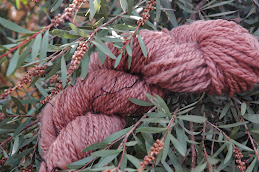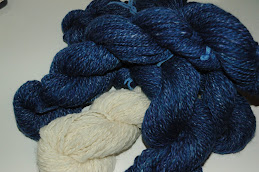Wednesday, August 20, 2008
On top of the world
 My favourite spot in Victoria is just below the summit of Little Higginbotham on Mt Hotham. From the hill beside the road to the sanitation works you can look out over the valley and feel on top of the world.
My favourite spot in Victoria is just below the summit of Little Higginbotham on Mt Hotham. From the hill beside the road to the sanitation works you can look out over the valley and feel on top of the world.The mountain totally changes in winter.
A few months ago I tried to capture the same view during the snow season.
The road to Mt Hotham was clear when we arrived but half a metre of snow fell while we were there, turning even the distant hills white.I plunged down to my knees in soft powder snow while trying to recapture this scene.
The winter photo was going to replace the summer one for a while but I prefer to look at blue skies and clouds when I'm stuck indoors.
Friday, August 15, 2008
Survival games
The first time I stayed at Uncle Charlie's house he said: ``Don't worry if you hear strange noises in the night. It will just be me.''
Uncle Charlie was a prisoner on the infamous Burma Railway during WWII and still had nightmares about his experiences, even many decades later.
We would sit in his kitchen late at night and play a game that could be called ``survival''.
He would say something like: ``If we were under attack, where would you escape to?''
I always chose to head for the hills, somewhere far from a city, somewhere like where Uncle Charlie lived at Nowa Nowa in Gippsland.
``And what would you take with you?'' he would ask.
I chose sheep and bees. Sheep because I could spin their fleece to make clothing (it gets cold in Gippsland in winter) and I could make cheese from their milk. So I needed a ram and a few ewes.
Bees would provide honey and pollinate flowers to provide fruit and vegetables.
That was probably cheating a bit because I hadn't taken seeds or seedlings with me but I figured if I found an old settlement in the bush something would have been planted in the past and allowed to go to seed. So I would use the fruits of someone's labour.
``And who would you take with you?'' he would ask. ``What skills would they have?''
I wanted someone who could cut wood.
My aunt used to cut the wood at my grandmother's house. She used to let me try to split the kindling when I was old enough to hold the axe. But I was never very good at splitting kindling.
So I would need an axeman, preferably one who could make furniture and build a shelter.
I didn't fancy spending the winter sheltering under wattle and daub.
Uncle Charlie said he would make an amphitheatre in the bush. He would need orators and singers and actors to appear in his amphitheatre.
He had picked out just the spot on his farm, a natural amphitheatre on a hillside beside the river. He showed me where to stand to make my voice echo out across the river.
And I sat high on the hill and heard his voice ring clear and pure as he recited a poem from his past. I don't remember what it was.
I wish I had kept a diary more often in my life. Most of my diaries have been lost when I moved house or threw away what I thought I did not need.
Needs change.
But the essence of people met remains.
From my friend Colleen I inherited two pieces of advice. To begin each day as if it's your first, and end it as if there will be no tomorrow. I count that as one.
The other piece of advice was about being a victim. When I was feeling hard done by she would ask ``How big is ...'', meaning the person giving me grief. ``How much power does he have?'' ``You set your own mood,'' she would say. ``No one can make you feel down unless you let them.''
She also said I had a choice. I could give in and be a victim all my life or stand up for what I believed in and face the consequences.
Colleen died more than 10 years ago but what she gave me still lives.
That's what immortality is really about.
Another friend, Lee, used to say ``The light at the end of the tunnel could be a freight train heading your way.'' And ``If you want to know what God thinks of money, look at the people he gave it to.''But my favourite saying came from Sandi, who used to ask me to come for a drive around the block whenever she was ready to explode over some problem or other at the school where we taught.
We had many drives around the block.
``You'll win a high place in heaven,'' she used to say, whenever someone helped her out of one of her crises.
Most of my friends are spread far and wide. But when we get together it feels as if we have spent days, not years, apart.
Must go, the housework beckons.
Labels:
Burma Railway,
empowerment,
fleece,
money,
self-esteem,
spinning
Wednesday, August 13, 2008
Equality and warm beer
Relatives I hadn't seen in years came over on Sunday for a barbecue. We sat around the table reminiscing - my cousin Maureen, her husband Tony, Maureen's brother Brian and his wife Lee, my cousin Alan and his wife Carmel, my parents, Auntie Florrie, and Bill and the kids.
Someone opened a cold beer, sparking memories of Uncle Clyde.
Clyde was a distant in-law.
``He would ask if you wanted a beer and always got the bottle from the cupboard under the sink,'' Tony said. ``The beer was always hot and years old.''
Clyde was a little man, an invalid with a stingy wife. He had something wrong with his neck and his head was always turned to the side.
Clyde used to ride his bike with his head like that, my cousin Maureen said.
``When he died, the undertakers straightened his head before they put him in the coffin,'' she said. ``Everyone said it didn't look like Clyde.''
Whenever I visited, Clyde would be sitting in the kitchen cutting up squares of newspaper. I thought that was what he did all day while his wife Maggie went out to work.
He used to delegate the square cutting to me when I visited and Maggie would thread them on a piece of string to hang on a nail in the outside loo.
Everyone I knew used toilet paper but Maggie said that was a waste of good money.
Uncle Perc also used to serve up hot beer, my Dad said.
Perc had been the gardener, and his wife Lorna the housekeeper and cook, at a mansion near Ripponlea. Lorna was a formidable woman, a housekeeper in the old style.
Perc was my grandmother's brother and they grew up at Ripponlea, where their mother was the housekeeper. She was also the caretaker at the estate during the wealthy owners' long overseas travels.
When Perc and Lorna retired, they had to find somewhere to live and moved to a tiny cottage in Mornington. It was a hovel with a dirt floor when they moved in, but it was all they could afford after a lifetime of living in servants' quarters in other people's mansions.
Whenever we visited at Mornington, the women would sit inside and Perc would take the men outside. He would stand a few logs of wood on their ends and the men would sit and yarn.
If I was quiet I could slip out to the back yard with them and sit on a log and listen.
Perc was a great storyteller. The men would drink their hot beer and rock with laughter at his yarns as they perched on their rocking lumps of wood.
All men were equal in Perc's eyes. Millionaires and paupers, he treated them all the same.
Once when he was working at the mansion the leader of the Liberal Party, Robert Menzies, came to dinner. His host sent word down to Lorna and Perc in the kitchen that ``Mr Menzies'', later Sir Robert Menzies, had admired Perc's roses.
Uncle Perc ignored the hint.
A second message came down to Lorna.
``Mr Menzies would like a bunch of roses for his wife,'' Lorna was told.
To which Uncle Perc replied: ``If Mr Menzies wants roses for his wife, tell him to pick his own bloody roses.''
Auntie Lorna once showed me her diary from those days. She had kept a diary all her life.
She was scared they would lose their jobs over the incident with Mr Menzies and the roses but Uncle Perc would not bend. He was a Labor man and would never kowtow to a Liberal.
But the way Perc told the story, it was a great joke. My dad laughed so much he had tears streaming down his face every time.
Soon after the roses' incident Uncle Perc changed jobs. He became greenkeeper at a nearby lawn bowls club, where he ruled like an autocrat.
No-one, no matter how wealthy, was allowed on the rinks unless Perc said so.
He was a skilled gardener so he got away with it, until he grew too old to do the work.
And Lorna was such a great cook that she was kept on at the mansion even after her husband quit, or was fired, I never knew which.
After they retired, Lorna received a small retainer to look after the wealthy family's Mornington holiday home, which was a few blocks from her small cottage.
She took me to the holiday home one day and allowed me to dust the grand piano in the drawing room and proudly showed me the grand furniture and enormous living rooms.
Lorna had the place to herself most days. I think she liked to be there, dusting beautiful things, even if they weren't hers.
Perc preferred his own fireside.
Subscribe to:
Posts (Atom)
Dyeing

Handspun fawn corriedale dyed with Gaywool's bulloak.
Spinning

Handspun yarn for a jacket.



